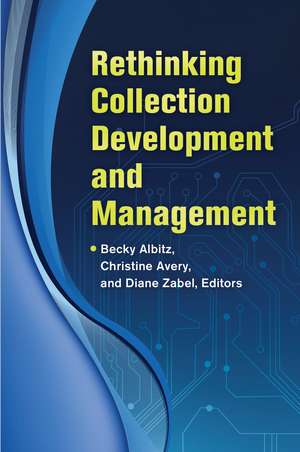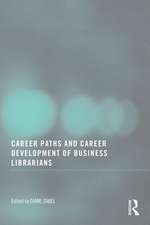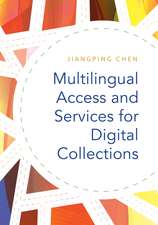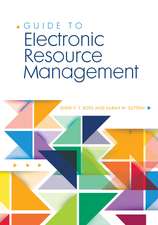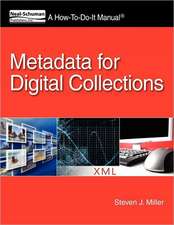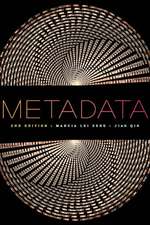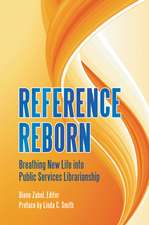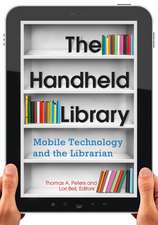Rethinking Collection Development and Management
Editat de Becky Albitz, Christine Avery, Diane Zabelen Limba Engleză Paperback – 24 feb 2014 – vârsta până la 17 ani
Preț: 359.32 lei
Preț vechi: 483.40 lei
-26% Nou
Puncte Express: 539
Preț estimativ în valută:
68.76€ • 74.67$ • 57.76£
68.76€ • 74.67$ • 57.76£
Carte tipărită la comandă
Livrare economică 23 aprilie-07 mai
Preluare comenzi: 021 569.72.76
Specificații
ISBN-13: 9781610693059
ISBN-10: 1610693051
Pagini: 408
Dimensiuni: 156 x 235 x 25 mm
Greutate: 0.68 kg
Editura: Bloomsbury Publishing
Colecția Libraries Unlimited
Locul publicării:New York, United States
ISBN-10: 1610693051
Pagini: 408
Dimensiuni: 156 x 235 x 25 mm
Greutate: 0.68 kg
Editura: Bloomsbury Publishing
Colecția Libraries Unlimited
Locul publicării:New York, United States
Caracteristici
Provides an up-to-date professional guide that complements traditional collection management texts
Notă biografică
Becky Albitz, MLS, EdD, is director of the James A. Cannavino Library at Marist College, Poughkeepsie, NY. Christine Avery is visiting collection development program officer for the Association of Research Libraries.Diane Zabel is the Louis and Virginia Benzak Business Librarian at Pennsylvania State University and editor of Libraries Unlimited's Reference Reborn: Breathing New Life into Public Services Librarianship.
Cuprins
AcknowledgmentsIntroductionPART I: SELECTION AND ASSESSMENTChapter 1: Forces Shaping Scholarly PublishingRobert W. BoissyChapter 2: The Ghosts in the Stacks: Collection Development Practice Past, Present, and Future in Academic Research LibrariesMark SandlerChapter 3: Who Does What? Building Relationships between Technical and Public Services StaffLaurel TarulliChapter 4: Evaluating Subscription DatabasesNadine P. Ellero and Juliet T. RumbleChapter 5: Perspectives on Weeding in Academic Library CollectionsDavid A. TyckosonChapter 6: Weeding the Collection: Perspectives from Three Public LibrariansMerle Jacob, Sue O'Brien, and Bonnie ReidChapter 7: Education for Collection Development and ManagementJohn M. BuddPART II: ACQUISITIONSChapter 8: Demand-Driven Acquisitions: Just in TimeRobert AlanChapter 9: HAM: A Hybrid Acquisitions Model for Public LibrariesSian BrannonChapter 10: Beyond Reviews: Understanding the Selection Cycle in Public Library Collection DevelopmentNeal WyattChapter 11: The Big Deal and the Future of Journal Licensing in Academic LibrariesJeffrey D. CarrollChapter 12: Collection Development between Teaching Mission and Resource Management: The Case of Carleton CollegeKathy Tezla and Victoria MorseChapter 13: Lease Plans in Academic LibrariesAnne BehlerChapter 14: Lease Services as a Collection Development StrategyKathleen SullivanChapter 15: Self-Publishing: Does It Belong in the Collection?James LaRueChapter 16: eBooks in Academic LibrariesMichael Levine-ClarkChapter 17: eBook Collection Development in Public LibrariesChristopher BakerChapter 18: Streaming Videodeg farrellyPART III: ACCESS, COOPERATIVE EFFORTS, SHARED COLLECTIONSChapter 19: Cataloging for Collection ManagementLinda R. Musser and Christopher H. WalkerChapter 20: Do We Need Dewey? Anythink Libraries in ColoradoLogan MacdonaldChapter 21: Rethinking Access to Collections in the Discovery AgeJody Condit Fagan and Meris A. MandernachChapter 22: Consortia Services in Collection ManagementKim ArmstrongChapter 23: Floating Collections: Perspectives from an Academic LibraryKaren E. GreeverChapter 24: Floating Collections: Perspectives from a Public LibrarianWendy BartlettChapter 25: Beyond My People and Thy People, or the Shared Print Collections ImperativeRobert H. KieftPART IV: PRESERVATION AND SPECIAL COLLECTIONSChapter 26: Thinking about Collection Development in Special CollectionsSteven K. GalbraithChapter 27: Collaborative Disaster NetworksThomas F. R. ClaresonChapter 28: Digitization ProjectsL. Suzanne KellermanChapter 29: Print and Digital PreservationJacob NadalEpilogueIndexAbout the Editors and the Contributors
Recenzii
This title is a perfect fit for both public and academic librarians. The word 'rethinking' is apt; this guide truly examines current changes in library collections. New librarians will want to dive into the volume . . . Experienced librarians might skip around, using the book as a reference for pertinent topics, such as ebooks and digital collections. . . . It is a solid companion to any of the American Library Association fundamentals of collection development books. The textbook-style reading is ideal for academic librarians, public librarians, or MLS students.
What makes this book of considerable merit is it moves past providing mainly foundational concepts and traditional topics. Instead, much of the book focuses on advanced theory and its practical application in the field. . . . [P]rofessionals in these positions may find this book beneficial as it discusses technological innovation and electronic collections. . . . Out of the few collection development texts available, this book is highly recommended.
This collection is inspiring. . . . In Rethinking Collection Development and Management, librarians and administrators will find creative ideas and thoughtful approaches to the many challenges of twenty-first century collection development.
This is an interesting and ambitious book that provides a good picture of the many changes taking place in collectiondevelopment and management. It willbe useful to those interested in lookingat the current state of particular areas ofcollections work, as well as someonetrying to understand what is happeningto the field generally. It should proveuseful to practicing librarians in bothacademic and public libraries and tostudents in library school who want an overview of the area. . . . . [T]he book serves as a noteworthy attempt to document numerous changes occurring in the field and anyone who is interested in collections will find it worth reading.
Rethinking Collection Development and Management seeks to cover a lot of ground, and the chapters range fromeditorial to prescriptive in tone. The unifying thread, however, is the described subjective experiences. Indeed, as an anthology this is not unusual, and the stand-alone quality of each chapter lends the text the supplementary facility advertised. While articles of comparable tone and quality are frequently published in the professional literature, this volume juxtaposes the perspective of the public librarian alongside that of the academic and that of one working in a large research university alongside the small liberal arts college. In this way the reader is given the opportunity to rethink, as it were, his or her own experience of collection development and management in the larger context of an evolving field.
In Rethinking Collection Development and Management, the editors have assembled 29 interesting and thought-provoking essays pertaining to the full spectrum of collection development. . . . This book is recommended for larger public and academic libraries and for all libraries that are wrestling with the increasing complexities surrounding the concept of collection development as libraries transition from providing access to scarce materials to ubiquitous access in an increasingly digital arena.
What makes this book of considerable merit is it moves past providing mainly foundational concepts and traditional topics. Instead, much of the book focuses on advanced theory and its practical application in the field. . . . [P]rofessionals in these positions may find this book beneficial as it discusses technological innovation and electronic collections. . . . Out of the few collection development texts available, this book is highly recommended.
This collection is inspiring. . . . In Rethinking Collection Development and Management, librarians and administrators will find creative ideas and thoughtful approaches to the many challenges of twenty-first century collection development.
This is an interesting and ambitious book that provides a good picture of the many changes taking place in collectiondevelopment and management. It willbe useful to those interested in lookingat the current state of particular areas ofcollections work, as well as someonetrying to understand what is happeningto the field generally. It should proveuseful to practicing librarians in bothacademic and public libraries and tostudents in library school who want an overview of the area. . . . . [T]he book serves as a noteworthy attempt to document numerous changes occurring in the field and anyone who is interested in collections will find it worth reading.
Rethinking Collection Development and Management seeks to cover a lot of ground, and the chapters range fromeditorial to prescriptive in tone. The unifying thread, however, is the described subjective experiences. Indeed, as an anthology this is not unusual, and the stand-alone quality of each chapter lends the text the supplementary facility advertised. While articles of comparable tone and quality are frequently published in the professional literature, this volume juxtaposes the perspective of the public librarian alongside that of the academic and that of one working in a large research university alongside the small liberal arts college. In this way the reader is given the opportunity to rethink, as it were, his or her own experience of collection development and management in the larger context of an evolving field.
In Rethinking Collection Development and Management, the editors have assembled 29 interesting and thought-provoking essays pertaining to the full spectrum of collection development. . . . This book is recommended for larger public and academic libraries and for all libraries that are wrestling with the increasing complexities surrounding the concept of collection development as libraries transition from providing access to scarce materials to ubiquitous access in an increasingly digital arena.
